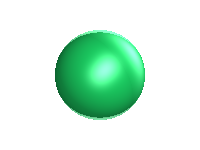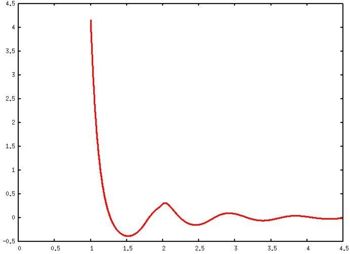Hard sphere model

The hard sphere intermolecular pair potential is defined as
where is the intermolecular pair potential between two spheres at a distance , and is the diameter of the sphere.
First simulations of hard spheres
The hard sphere model was one of the first ever systems studied:
- Marshall N. Rosenbluth and Arianna W. Rosenbluth "Further Results on Monte Carlo Equations of State", Journal of Chemical Physics 22 pp. 881-884 (1954)
- W. W. Wood and J. D. Jacobson "Preliminary Results from a Recalculation of the Monte Carlo Equation of State of Hard Spheres", Journal of Chemical Physics 27 pp. 1207-1208 (1957)
- B. J. Alder and T. E. Wainwright "Phase Transition for a Hard Sphere System", Journal of Chemical Physics 27 pp. 1208-1209 (1957)
Radial distribution function
The following is a plot of the hard sphere radial distribution function at (produced using the computer code written by Jiří Kolafa)

Over the years many groups have studied the radial distribution function of the hard sphere model:
- John G. Kirkwood, Eugene K. Maun, and Berni J. Alder "Radial Distribution Functions and the Equation of State of a Fluid Composed of Rigid Spherical Molecules", Journal of Chemical Physics 18 pp. 1040- (1950)
- B. R. A. Nijboer and L. Van Hove "Radial Distribution Function of a Gas of Hard Spheres and the Superposition Approximation", Physical Review 85 pp. 777 - 783 (1952)
- B. J. Alder, S. P. Frankel, and V. A. Lewinson "Radial Distribution Function Calculated by the Monte-Carlo Method for a Hard Sphere Fluid", Journal of Chemical Physics 23 pp. 417- (1955)
- Francis H. Ree, R. Norris Keeler, and Shaun L. McCarthy "Radial Distribution Function of Hard Spheres", Journal of Chemical Physics 44 pp. 3407- (1966)
- W. R. Smith and D. Henderson "Analytical representation of the Percus-Yevick hard-sphere radial distribution function", Molecular Physics 19 pp. 411-415 (1970)
- J. A. Barker and D. Henderson "Monte Carlo values for the radial distribution function of a system of fluid hard spheres", Molecular Physics 21 pp. 187-191 (1971)
- J. M. Kincaid and J. J. Weis "Radial distribution function of a hard-sphere solid", Molecular Physics 34 pp. 931-938 (1977)
- S. Bravo Yuste and A. Santos "Radial distribution function for hard spheres", Physical Review A 43 pp. 5418-5423 (1991)
- Andrij Trokhymchuk, Ivo Nezbeda and Jan Jirsák "Hard-sphere radial distribution function again", Journal of Chemical Physics 123 024501 (2005)
- M. López de Haro, A. Santos and S. B. Yuste "On the radial distribution function of a hard-sphere fluid", Journal of Chemical Physics 124 236102 (2006)
Equations of state
See: Equations of state for hard spheres (for example, the celebrated Carnahan-Starling equation of state). For the virial equation of state associated with the hard sphere model see: Hard sphere: virial coefficients
Fluid-solid transition
The hard sphere system undergoes a fluid-solid first order transition at , .
Solid structure
Experimental results
Pusey and van Megen used a suspension of PMMA particles of radius 305 10 nm, suspended in poly-12-hydroxystearic acid:
For results obtained from the Colloidal Disorder - Order Transition (CDOT) experiments performed on-board the Space Shuttles Columbia and Discovery see Ref. 3.
External links
- Hard disks and spheres computer code on SMAC-wiki.
Related systems
Hard spheres in other dimensions
- 1-dimensional case: hard rods.
- 2-dimensional case: hard disks.
- Hard hyperspheres
References
- Robin J. Speedy "Pressure of the metastable hard-sphere fluid", Journal of Physics: Condensed Matter 9 pp. 8591-8599 (1997)
- Robin J. Speedy "Pressure and entropy of hard-sphere crystals", Journal of Physics: Condensed Matter 10 pp. 4387-4391 (1998)
- Z. Chenga, P. M. Chaikina, W. B. Russelb, W. V. Meyerc, J. Zhub, R. B. Rogersc and R. H. Ottewilld, "Phase diagram of hard spheres", Materials & Design 22 pp. 529-534 (2001)
- W. R. Smith, D. J. Henderson, P. J. Leonard, J. A. Barker and E. W. Grundke "Fortran codes for the correlation functions of hard sphere fluids", Molecular Physics (article ahead of the print edition)







